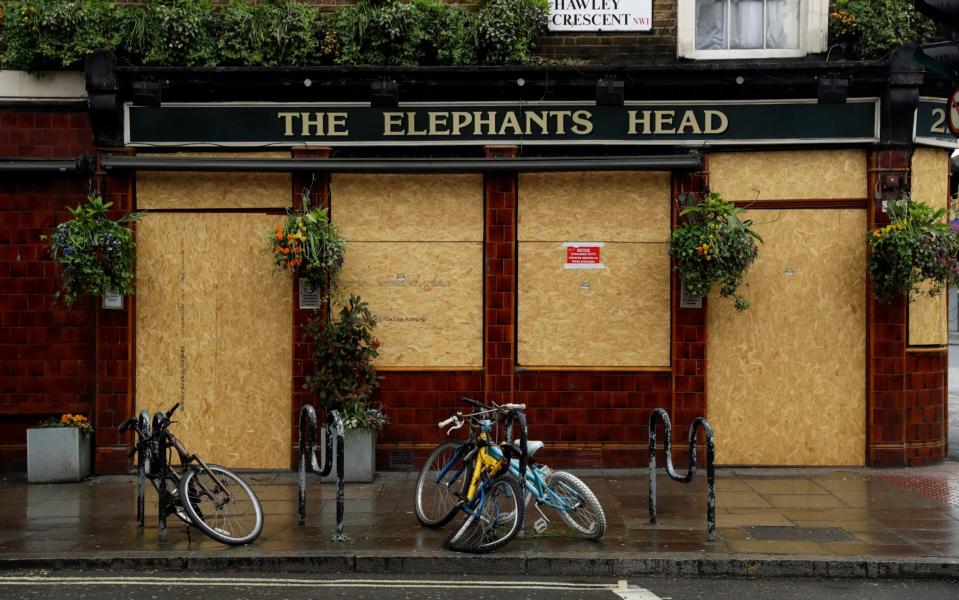Pubs and restaurant bosses fear mass closures and job cuts after Sunak fails to go far enough

The ravaged hospitality industry faces thousands of job losses and a massive wave of closures after bosses warned that Rishi Sunak’s latest rescue scheme will not stop them laying off staff.
Pub and restaurant chiefs said they have no option but to go ahead with mass redundancies in the face of draconian measures to control coronavirus, despite the Chancellor’s new wage subsidy for part-time workers.
Mr Sunak’s support scheme is expected to pay out £5bn over six months by topping up the wages of workers whose hours have been cut – but it is feared onerous conditions could put many major employers off.
Patrick Dardis, chief executive of pub chain Young’s, said: “It won’t stop businesses and us from laying off staff.
“Our plan before today’s announcement will not alter as a consequence of what was said. From November, we will only employ and pay staff that are working in our pubs on the hours that are needed.”
Simon Emeny, boss of rival Fuller’s, said: “The announcement on Tuesday, particularly preventing people from going back to the offices, will make it very hard for us to keep pubs open and protect jobs in central London.
“Rishi Sunak has been given a hospital pass by the prime minister. In order to protect jobs under the circumstances the prime minister has created, we needed an extension of the furlough scheme for the six months these restrictions will be in place for.”
Hospitality firms are expected to bear the brunt of the damage from the latest coronavirus crackdown, with office workers told to stay at home where possible and pubs and restaurants forced to shut at 10pm.
Bosses said they will now be forced to lay off workers and shut sites to survive because the new support does not go far enough. A mass of venues in major cities could close forever, with central London hit hardest.
About 1m of the industry’s 3.2m workers are being paid through the Government’s furlough scheme, which ends next month.
Will Wright, head of regional restructuring at KPMG, said: “The sense of foreboding in the casual dining industry over the last 48 hours is palpable.
“Aggressive planning for all scenarios is now back on the table, with yet more [rent renegotiations] and administrations having to be considered if operators are to survive over the winter months.”
Mr Sunak’s new scheme will pay at least 77pc of employees’ salary over the next six months if they work at least a third of their usual hours, with the Government and employers topping up two-thirds of the lost pay from hours that are not worked.
The subsidy will be made available for all small and medium-sized businesses, but larger firms will need to prove that turnover has fallen by a third during the pandemic to qualify.
Mr Sunak said he also expected that large firms enrolled in the scheme will be prevented from paying dividends to shareholders or from making workers redundant.
Mr Dardis said the scheme is “tying businesses’ hands behind their back”, adding: “What’s the point in doing this, only for the Government to change tack again in a month’s time?”.
Tim Martin, chairman of JD Wetherspoon, said the curfew will reduce sales of “hard-pressed” pubs and restaurants who would be forced to cut jobs as a result.
He said: “The main issue is that government appears to have no strategy and is making micro moves and clarifications almost on a daily basis.
“The UK needs to be like the Queen Mary on an Atlantic crossing – just an occasional nudge on the tiller. Instead, we’re zig-zagging wildly which is economically very inefficient.”
Kate Nicholls, chief executive of UKHospitality, said: “This is a stay of execution but it’s not enough to save jobs. What we need for this to work for hospitality is for the Government to pick up the hours not worked and not shared between the employer and the Government.”
Ralph Findlay, chief executive of Marston’s, said: “It is unlikely to make a difference to the plans of businesses in this sector because they're not going to be wanting to be responsible for paying the cost of people who probably haven't got a job. They will want fewer people working longer hours rather than more people working fewer hours.”
Jonathan Geldart, head of the Institute of Directors, added that there are still gaps in the Chancellor’s support for many parts of the economy, including many self-employed and small company directors.
He said: “With business investment in the doldrums, the Treasury must act to provide reliefs for firms to spend on digital technology and skills, particularly as SMEs look to adapt to home-working.
“The Government should also remain open to widening access to its loan schemes, and ensuring local authorities have the funding to provide grant support to firms that have been shut out of other channels.”

 Yahoo News
Yahoo News 